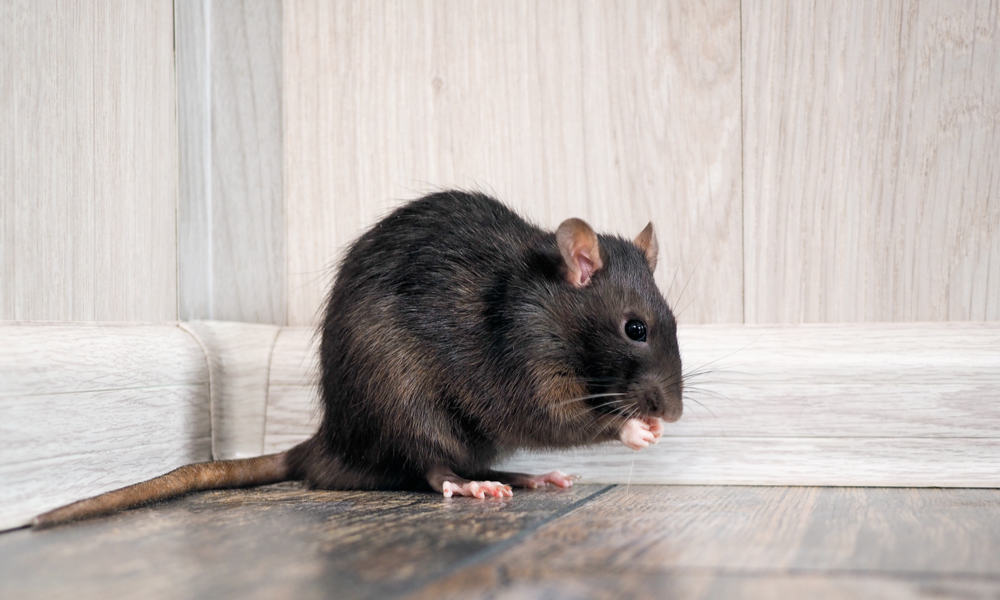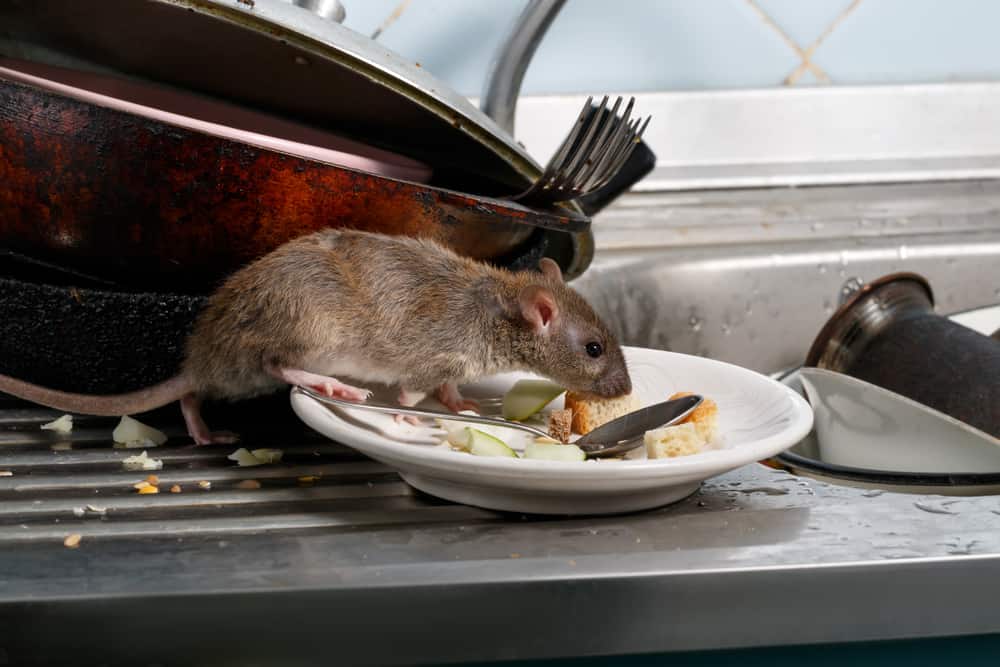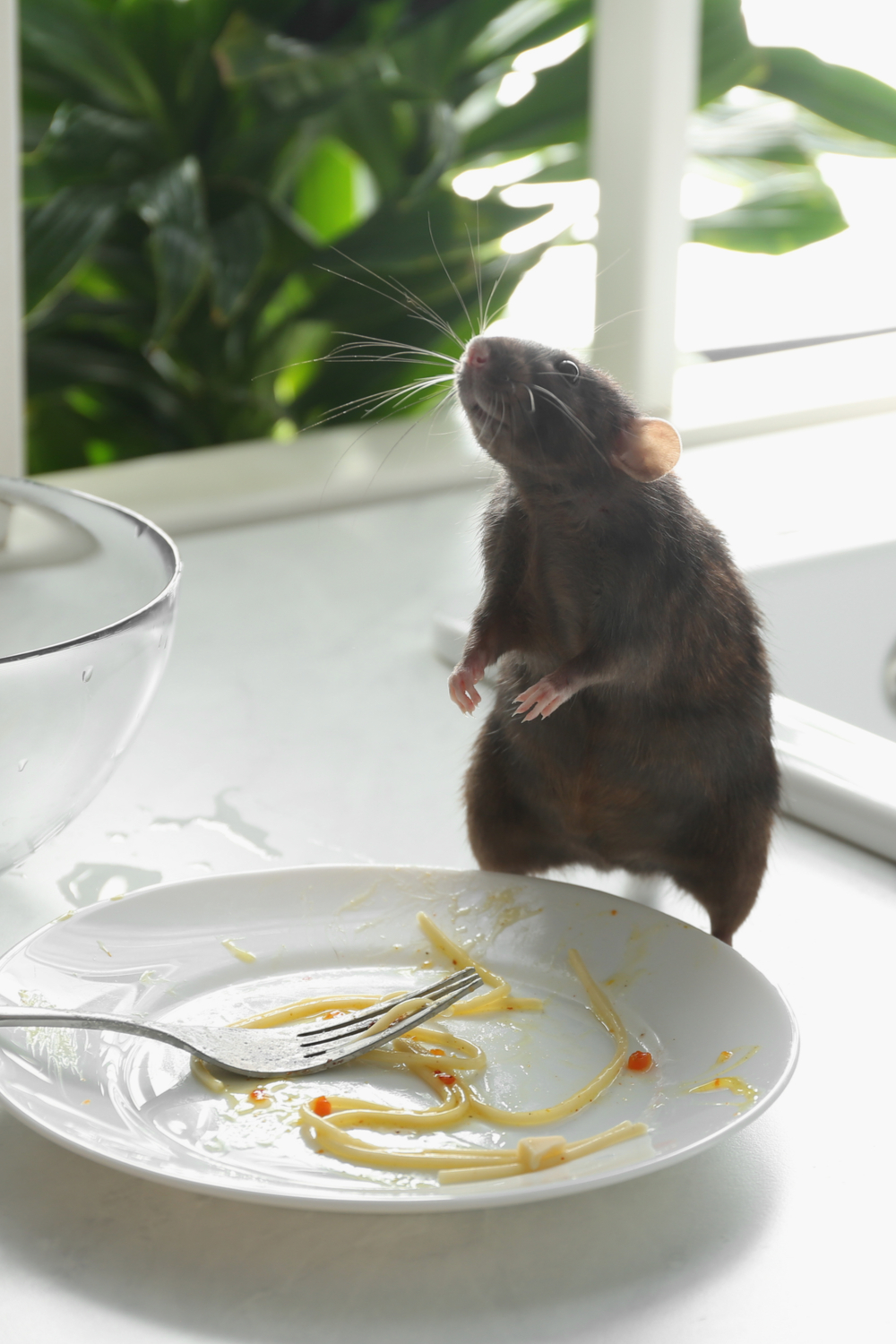Rats are one of the top household pests, and getting rid of them can be a challenge. So what do rats eat? Why do they come into your home? And what can you do about it when they’re there?
That’s what we’re here to find out! We’re going to learn about the eating habits of rats, and the damage they can cause. And we’ll share some practical tips to get rid of them if they’ve moved into your home.
What Do Rats Like to Eat?
Rats aren’t picky when it comes to their food. They’ll take the opportunity to eat pretty much anything that’s on offer. But that’s not to say that they don’t have preferences. Understanding these can help you avoid attracting rats into your home.
We’ll talk more about that in a moment. But if you have pet rats, you’ll be interested in what they eat for other reasons! This YouTube video from Dr Anthony Pliny at Howcast takes you through the options to give pet rats a healthy diet.
Rats’ dietary options will depend on where they live, and if they’re in an urban or rural location. If there are humans living in the same area, rats will usually have a much wider choice of foods. Litter, trashcans and even compost heaps can be great sources of food for a rat.
For that reason, rats in the wild are more likely to be vegetarians, whilst those in towns are more likely to eat meat.
But what specifically do they like to eat?
- Seeds and grains – For rats in the wild, particularly in rural area, seeds and grains are usually a staple part of their diet. They can be found at all times of the year, and rats generally aren’t fussy about the kinds they’ll eat.
- Fruit and vegetables – Rats are pretty good at getting their five portions a day! In the wild, their options when it comes to vegetables are likely to be pretty limited. But they will eat fruit and berries.
- Nuts – Nuts are a great source of protein for wild rats. They’ll provide much more energy than chowing down on a berry. And unlike animal proteins, the rat won’t have to expend any energy in trying to catch it.
- Meat – Rats seem to enjoy the taste of meat. In the wild, that will usually mean feeding on dead or dying animals. This can even include other rats. In urban areas, discarded bones from chicken takeaways make a tasty treat.
- Eggs – Eggs are an excellent source of nutrition for rats. After all, they’re designed to provide everything the baby bird needs to develop. Rats will eat the eggs of wild birds – or domesticated hens, if they can get their paws on them.
Harm Caused By Rats
Despite some people choosing to keep rats as pets, they are mostly considered to be pests. So what harm do rats actually do?
Well, part of the problem with rats is their omnivorous nature. That means they will nibble at pretty much anything they come into contact with, trying to decide whether it’s food. Their teeth are also constantly growing, so biting on things is important to keep that growth in check.
All that biting and nibbling can cause a lot of problems in your home.
One of the key issues is damage to pipes and wiring. Rats will nibble at the insulation around electrical wires, and even pipes carrying water or gas. The insurance industry has estimated that the damage they cause to wiring is the key factor in around a quarter of all electrical fires.
Rats also carry a number of diseases. They are famously blamed for causing the Black Death, the plague that devastated Europe and Asia in 14th century. It was actually fleas that carried the bacteria responsible, Yersina pestis. But since the fleas largely lived on rats, they were indirectly responsible.
Rats themselves carry a number of diseases that can be transmitted to humans through their urine. These include Weil’s disease and Hantavirus. They also carry bacteria like salmonella and listeria, which cause fever and diarrhea if ingested.
All these issues mean that rats are best kept out of your property. And indeed, the harm they can do means that in some parts of the world, property owners have legal obligations to keep their homes rodent-free.
Tips To Get Rid of Rats
1. Practice good hygiene to avoid attracting rats
As ever, prevention is better than cure. There are a number of ways to reduce the chances of rats finding their way into your home.
Good hygiene will reduce the risk of rats being attracted by the smell of food. Keep leftovers in airtight containers, don’t leave dirty dishes on work surfaces, and sweep up any crumbs.
Rats can get into the tiniest spaces if they smell food. So if you snack whilst sitting on the sofa, don’t forget to vacuum regularly beneath the seats and cushions.
Outside, ensure that garbage pans are kept covered with tightly fitting lids. And if you have a compost heap, keep it well away from the house.
Check for any small holes that could let in rats and seal them with caulk. That will also prevent smaller pests like ants finding their way inside.
2. Use an ultrasonic deterrent
Another way to prevent rats from entering your home is to employ ultrasonic deterrents. These work by emitting a loud noise. The frequency is too high for humans to hear, but is uncomfortable to rodents.
There are a wide range of devices on the market. Some run on batteries, whilst others need to be plugged in. Some are designed specifically for rats, whilst others can be adjusted to different frequencies for different pests.
One thing to be aware of if you have pets is that they may be able to hear the sound. And because it’s designed to be loud, it may be distressing to them too.
Look for options that have a pet-safe setting. And before leaving it on permanently, test it to check your pet’s reaction. All animals are different, and a sound that may not bother one cat or dog can drive another to distraction.
3. Use a non-lethal trap
There’s no need to kill rats that have ventured into your home. There are a wide range of non-lethal traps that work by simply luring then trapping the rat. They’re usually a simple plastic or metal box with a spring door.
When the trap is sprung, you can then take it away from your home to release the rat. This YouTube video shows you how to set a humane trap.
It’s very important to check these traps daily. A rat trapped inside for a long period will suffer distress, hunger and dehydration. So don’t leave traps set if you’re going to be away from your home for more than a day.
4. Use bleach in drains
If you’re connected to a mains sewer, rats may use waste pipes as entry points to your home. Try flushing bleach down your drains and commodes. The strong odor of the chemicals and its irritant properties will drive the rats away.
If this is the way rats are accessing your property, this is a much more effective approach than traps. Here, the chemicals are acting as a deterrent. With traps, on the other hand, you are reliant on a lure which will actually attract rats into your home.
5. Think twice before using poison and lethal traps
In addition to the problem of the lure, poison and lethal traps can cause further problems. That’s because they provide another food source for pests: a dead or dying animal. Even if the animal is inside a trap, the odor can attract other rats and pests to your home.
Checking traps daily is therefore just as important as it is for nonlethal traps. And most pest control companies will require you to pay for a return visit if you want them to empty the traps.
If you don’t want to do the job yourself, you have two options. You can pay a lot of money for a series of visits. Or you can accept that the odor of a decomposing rat will probably attract more of them.
Some types of trap are also exceptionally cruel. Glue traps should be avoided at all costs. Animals trapped in them will slowly starve, whilst becoming increasingly distressed. Whilst none of us want to share our homes with rats, there is simply no need for this level of cruelty.
6. Seek professional advice
if you’re struggling to resolve a rat problem, seek professional advice from a reputable source.
Depending on where you live, you may be able to call on the help of your local authority. Rat infestations are a public health issue, so they may be able to offer advice. And they won’t have a financial incentive to sell you a particular solution.
An expert pest control operative will be able to identify where rats may be accessing your property. And they can give you practical advice on how to drive them away.
Summary
That brings us to the end of our look at the question of what do rats eat. By thinking about the answer, we can avoid attracting them to our properties.
If you already have a rat problem, identifying where they’re entering your property will be the first step. And using deterrents and non-lethal traps will be both more effective and more humane than the alternatives.


